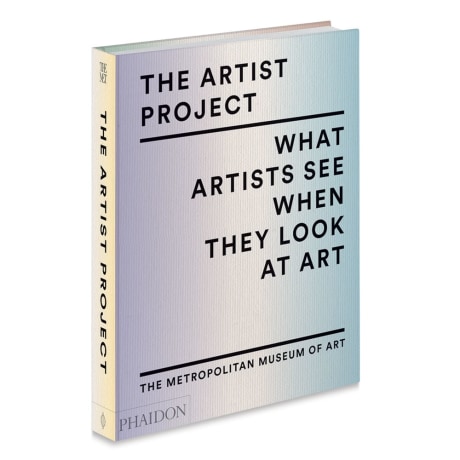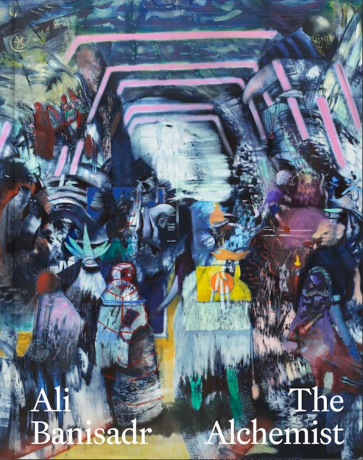
Video courtesy of Kasmin, Victoria Miro, Perrotin, Cristea Roberts Gallery, and Thaddaeus Ropac gallery. Created by Pushpin Films.
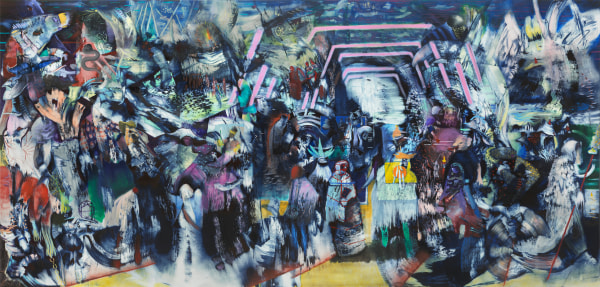
Ali Banisadr: The Alchemist is the first major U.S. museum survey of the Brooklyn-based, Iranian-born artist Ali Banisadr. Organized by the Katonah Museum of Art (KMA), this exhibition encompasses nearly twenty years of the artist’s singular practice, from 2006 to the present, across the mediums of painting, drawing, and printmaking. Sculpture, a new direction for the artist, will be presented for the first time. The exhibition will be accompanied by a catalogue with critical essays by Dr. Gražina Subelytė, Associate Curator, Peggy Guggenheim Collection; Dr. Bill Sherman, Director, The Warburg Institute, University of London; and Michelle Yun Mapplethorpe, Director, Katonah Museum of Art. It will also feature a transcribed conversation with the artist and noted art historian Robert Storr, and a fully illustrated plate section.
"al-kīmīā", 2025,Lithograph in seven colors on Rives BFK paper,Paper and image 14 ¾ x 11 inches / 37.5 x 28 cm
Edition of 60 plus 20 artist proofs and 3 printers proofs, Printed at ULAE studio, New York, Published by Cristea Roberts Gallery, London
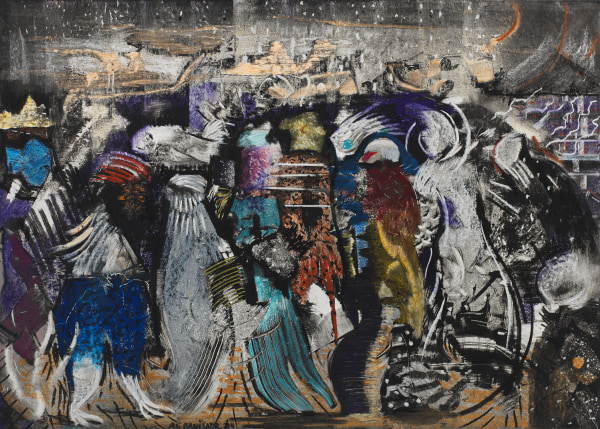
Chiaroscuro: A Century of Charcoal brings together works by over 30 artists made over the past 100 years. Charcoal is elemental. Born from fire, charcoal is made from wood (especially twigs of willow or vine) that has been heated to a high temperature in a low-oxygen environment (a process called pyrolysis). Its history as a medium is as old as human mark-making itself: the earliest artists, crouched in caves, dragged charred sticks across stone to summon animals and ancestors from the walls.
Sara Anstis, Ali Banisadr, María Berrío, David Bomberg, Pierre Bonnard, Peppi Bottrop, Vivian Caccuri, Emily Coan, Willem de Kooning, Lucian Freud, Adrian Ghenie, Jake Grewal, Scott Hunt, Chantal Joffe, Allan Kaprow, William Kentridge, Idris Khan, R.B. Kitaj, Leon Kossoff, Konstantina Krikzoni, Whitfield Lovell, Arieh Lubin, Anna Park, Celia Paul, Paula Rego, Jenny Saville, Aurel Schmidt, Shahzia Sikander, Barbara Walker, Olly Williamson, Alexandre Zhu
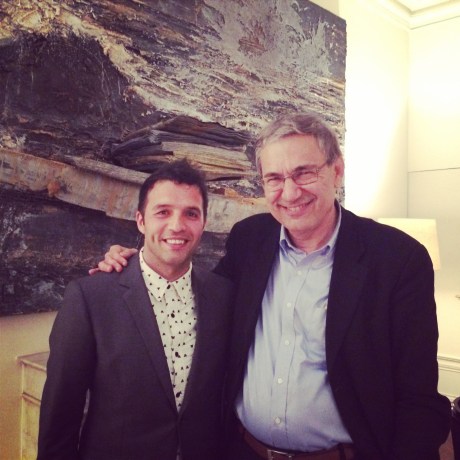
The Nobel Prize-winning novelist sat down with the painter Ali Bansiadr to discuss Pamuk’s newly published collection of illustrated notebooks.
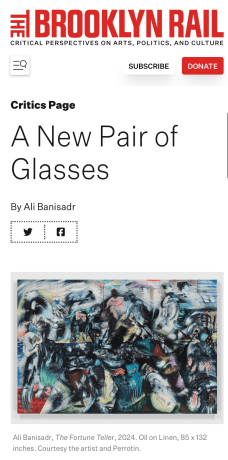
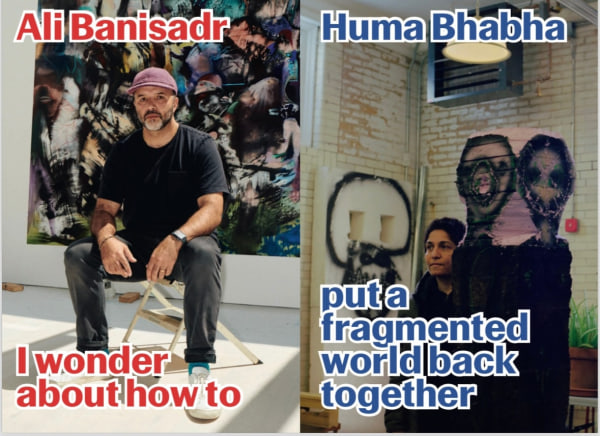
We visited Iranian-American painter Ali Banisadr in his Brooklyn studio and entered a world with many worlds inside.
Ali Banisadr was interviewed by Marc-Christoph Wagner in his studio in Brooklyn, New York, in March 2024.
Copyright: Louisiana Museum of Modern Art, 2024
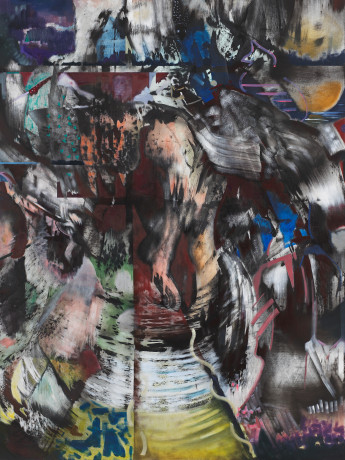
Victoria Miro is delighted to announce The Changing Past, an exhibition of paintings by Ali Banisadr. Opening in October, the first solo presentation of works by the New York-based artist since he joined the gallery in 2021 features a substantial body of paintings completed over the past two years. The exhibition will be accompanied by a catalogue featuring new writing on the artist.
Ali Banisadr, the Iranian American artist, draws inspiration from seventeenth-century Persian manuscript illustrations, mosaics, and European history paintings in his luscious and mesmerizingly complex canvases. On the occasion of the installation of his artwork Return to Mother at Mathey College, Banisadr will join Mitra Abbaspour, Haskell Curator of Modern and Contemporary Art, in conversation.
"Return to Mother", 2022, Oil in Linen, 82x180 inches
FEATURED ARTISTS: DAVID ALTMEJD, ALI BANISADR, MARK HANDFORTH,
OTIS KWAME KYE QUAICOE, MARIKO MORI, YOSHITOMO
NARA, IVAN NAVARRO, LAURE PROUVOST, TOMÀS
SARACENO, YINKA SHONIBARE, EMMANUEL TAKU,
KEHINDE WILEY...
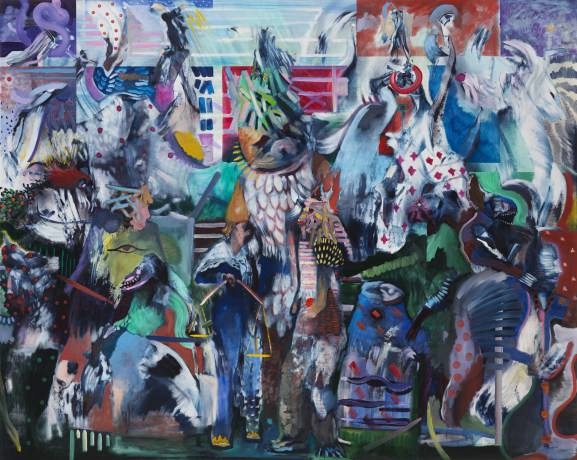
Featuring Diana Al-Hadid, Theodora Allen, Ali Banisadr, Bianca Bondi, Brendan Fernandes, Barbara Kasten, Lap-See Lam, Zoë Paul, Ana Pellicer, Naama Tsabar, and Sif Itona Westerberg.
Celebrating the spirit of resistance and revolt, the exhibition takes the figure of Daphne—the Ancient Greek nymph who turned herself into a laurel tree to escape Apollo’s pursuit—as metaphor to explore work that engages with hybrid figures, metamorphoses, and suspended states of becoming. Highlighting deconstructed impressions of the body in relation to mythologies of transformation, the exhibition focuses on work that features remnants of presence even when the figure is absent—objects that hold the memories of living things. Acting as portals, thresholds, and containers of shifting states, each work also engages with architecture as a framework, both in reference to the body and to spaces constructed for both personal and collective ritual.
Shades of Daphne is curated by Stephanie Cristello.
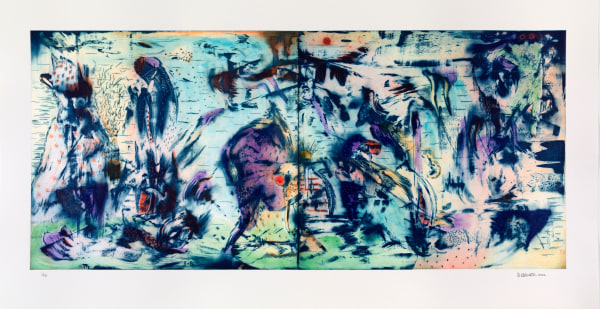
Opening Reception: January 26, 2023
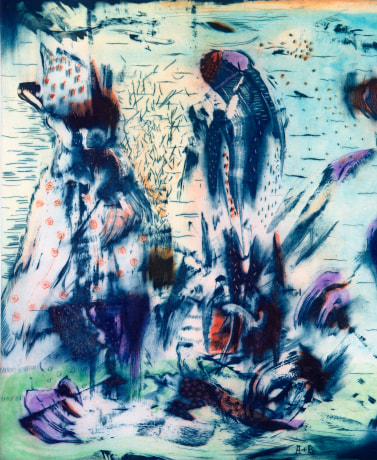
Gagosian is pleased to announce 100 Years, the gallery’s seventh annual group exhibition in collaboration with Jeffrey Deitch. On view during Miami Art Week at the historic Buick Building in the city’s Design District
Opening reception: Monday, November 28, 5–8pm
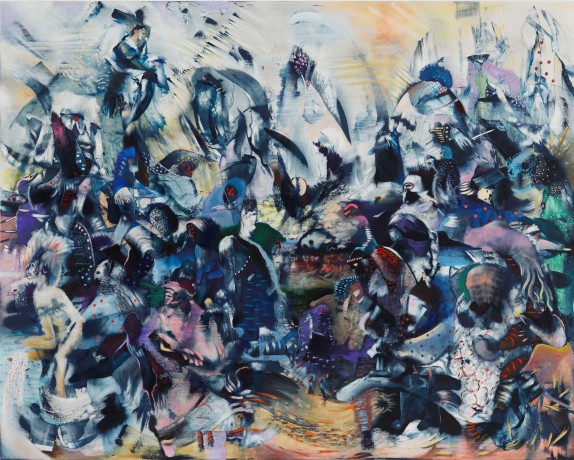
Return to Mother is an exhibition of new works by Tehran-born, US-based painter Ali Banisadr. Blending abstract gestures and delicate figurative details, the nine paintings on view will provide a kaleidoscopic vision of human history, inviting viewers to reflect on contemporary issues through the lens of the past, and to absorb the epistemic power of images.
The catalog for the first exhibition of Teheran-born artist Ali Banisadr's work at any Italian state museum - On display in two locations in Florence, the Stefano Bardini Museum and the Palazzo Vecchio, in August 2021 Beautiful Lies documents Teheran-born, New York-based artist Ali Banisadr's 2021 show in Florence in honor of the 700th anniversary of the death of Dante Alighieri. The "beautiful lies" beneath which truth is hidden is an expression used by Dante in describing his writing - and allegorical poetry in general - and it is perfectly suited to Banisadr's work. His powerful brushwork and strong colors go below the surface of his personal reality, revealing violence and isolation, anguish and wonder, but also memories and imagination. For this show, which was split between two venues, he was commissioned to create an installation of site-specific paintings (also called Beautiful Lies). The text is by Sergio Risaliti, director of the Museo Novecento in Florence and Mary Jo Bang the American Poet.
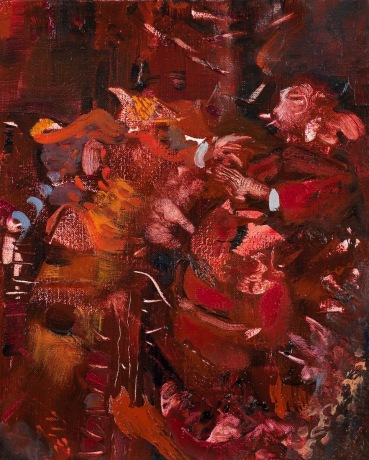
Metamorphoses are very noticeably present in contemporary art, where they take a tremendous number of different shapes. The Daphne without Apollo exhibition attempts to shed light on the possible interpretations of transformations by means of a broad range of examples by a wide variety of artists. Whether they are rooted in tradition or are more forward-looking, metamorphoses of humans and animals or plants can offer new insights into the natural world, especially in today’s technological society which is so defined by digital culture and thus our indirect and virtual experience of reality.
Siegfried Anzinger ● Ali Banisadr ● Hans Bellmer ● Sibylle Bergemann ● Jürgen Brodwolf ● Guillaume Bruère ● Damien Cabanes ● Lynn Chadwick ● Kevin Clarke ● Tony Cragg ● Isabelle Dutoit ● Bea Emsbach ● Leonor Fini ● Erich Gruber ● Ulrich Hachulla ● Angela Hampel ● Peter Hauenschild & Georg Ritter ● Gottfried Helnwein ● Leiko Ikemura ● Erich Kissing ● Bernd Koller ● Juul Kraijer ● Maria Lassnig ● Eugène Leroy ● Wolfgang Mattheuer ● Louise Nevelson ● Sigmar Polke ● Paula Rego ● Gerhard Richter ● Arno Rink ● Eugen Schönebeck ● Thomas Schütte ● Kiki Smith ● Nancy Spero ● Strawalde ● TOMAK ● Werner Tübke ● Paloma Varga Weisz
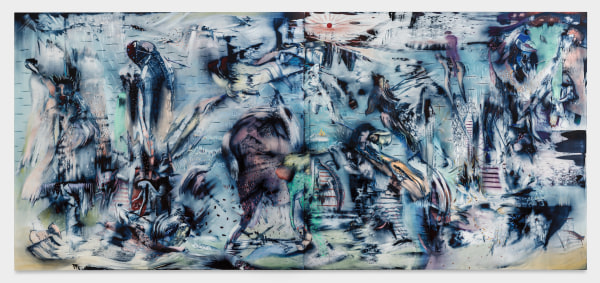
Join painter Ali Banisadr in conversation Kenneth Brummel, AGO associate curator of modern art, about Pablo Picasso’s Blue Period paintings of 1901-1904. How does Picasso’s Blue Period resonate with contemporary painters today? How do we as contemporary viewers interpret Picasso’s use of colour and form to address the social problems of his time? These and other issues will be explored by Banisadr and Brummel. Presented as part of Picasso: Painting the Blue Period. (on Zoom)
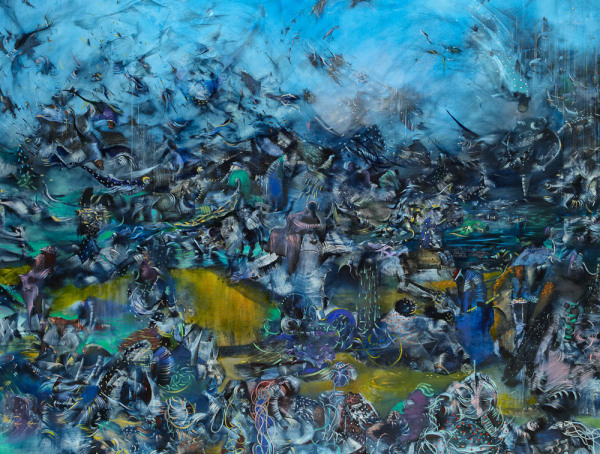
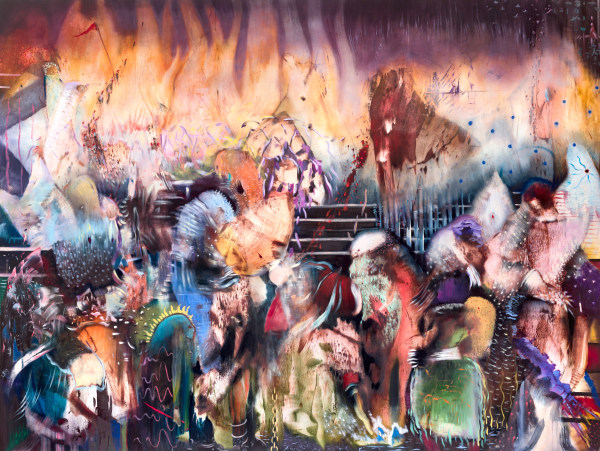
This year, Italy marks the 700th anniversary of the death of the medieval poet and philosopher Dante Alighieri, known as the Father of the Italian language, with a programme of commemorative events throughout 2021.
Ali Banisadr, Beautiful Lies will take place across two locations in Florence.
At the Palazzo Vecchio, Banisadr will present a trilogy of paintings inspired by Dante's Inferno and produced over the past year. This group of paintings will be installed across from Donatello's 'Judith and Holofernes'; in the prestigious Sala dei Gigli.
At Museo Bardini the artist will present 20 paintings from different periods, installed in dialogue with the museum's historical permanent collection.
As I fell into the rabbit hole of studying everything Dante, I realised that it kept going deeper and deeper. I am fascinated by how Dante was able to bring together fragments of knowledge from many different places and to make such an encyclopedic visionary world. His poems were intended to make it into our present day history, which is exactly what I have tried to do over the past year with this series of paintings based on Dante's Inferno. The series of works I have made will be shown in Dante's hometown, Florence at Palazzo Vecchio and Museo Bardini on the 700th year anniversary of his Death. The title of the show is "Beautiful Lies" which is what Dante had said about his own works and about allegorical poems, which hold truth within allegory as they unfold. I believe that Epic poems hold the essence of all the stories we have been telling ourselves, which is very important in my own work.
— Ali Banisadr, 2021
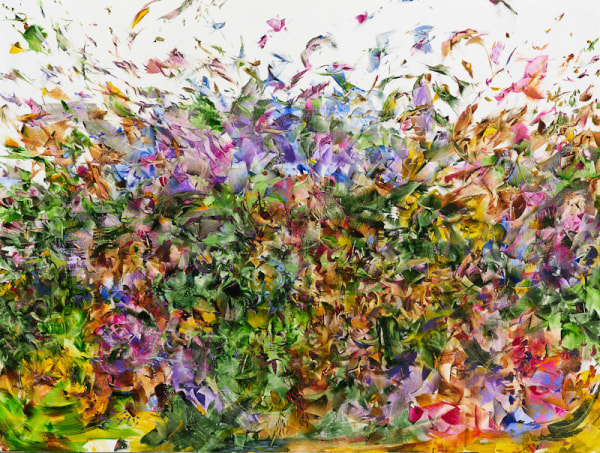
Exploring 5,000 years of art, design and culture, Epic Iran will shine a light on one of the greatest historic civilisations, its journey into the 21st century and its monumental artistic achievements, which remain unknown to many.
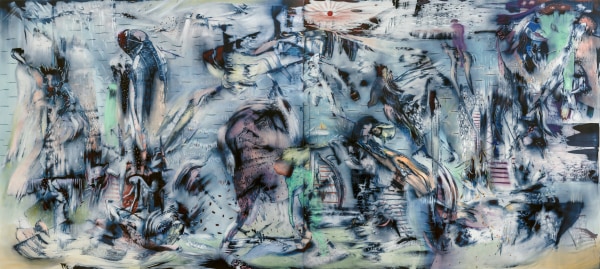
Kasmin is pleased to present the gallery’s first solo exhibition of work by artist Ali Banisadr (b.1976, Tehran). Comprising nine recent paintings, several of which were included in Banisadr’s critically-acclaimed museum show at the Wadsworth Atheneum Museum of Art, Hartford, CT, in 2020-21, the exhibition will also include a new large-scale diptych, the first multi-panel work by the artist in six years. These Specks of Dust coincides with the publication of a major monograph by Rizzoli Electa featuring contributions from Negar Azimi, Robert Hobbs, Joe Lin-Hill, and John Yau.
Publish Date: May 18, 2021
Format: Hardcover
Category: Art - Individual Artists - Monographs
Publisher: Rizzoli Electa
Trim Size: 10 x 12
Pages: 344
Banisadr’s first Avant Arte edition has seen him work closely with a team of artisan printers to develop a bespoke process combining traditional materials with cutting edge technology. In his own words, the challenge “was to adapt the language of my painting to printmaking as if I was painting it.”
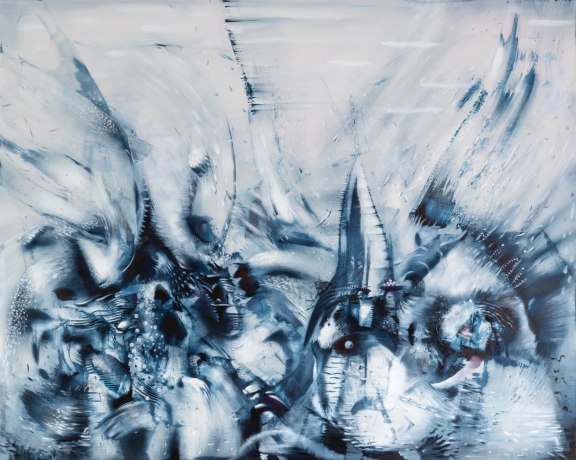
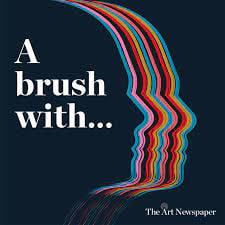
An in-depth podcast conversation on the artist's big influences, from Sufi poetry to Hieronymus Bosch. Hosted by Ben Luke.
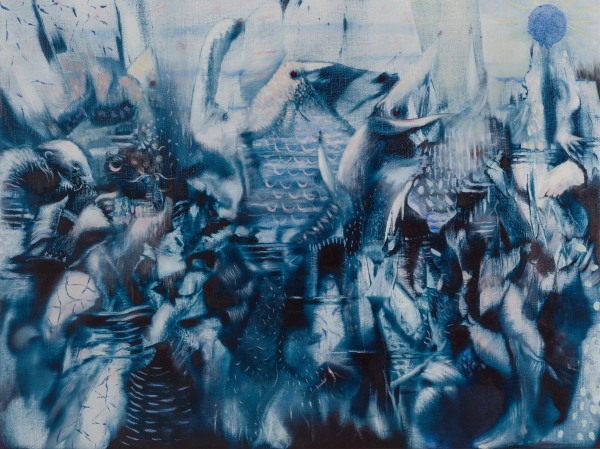
An exhibition of work by 19 artists celebrating the colour blue.
Milton Avery, Jules de Balincourt, Ali Banisadr, NS Harsha, Secundino Hernández, Ilse D’Hollander, Chantal Joffe, Isaac Julien, Idris Khan, John Kørner, Chris Ofili, Celia Paul, Grayson Perry, Howardena Pindell, Tal R, Paula Rego, Do Ho Suh, Sarah Sze, Flora Yukhnovich.
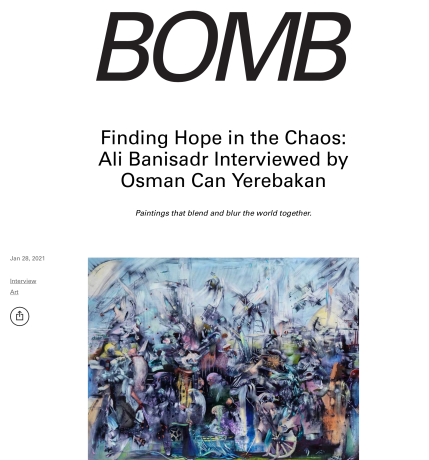
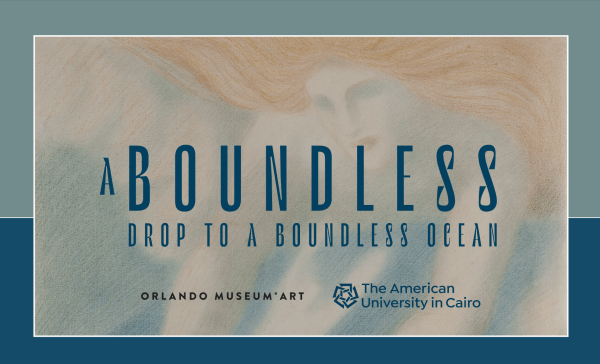
A Boundless Drop to a Boundless Ocean presents artworks by 21 US-based artists of Arab and Iranian heritage shown simultaneously in galleries at the Orlando Museum of Art and the Tahrir Cultural Center of the American University in Cairo. Curated by Dr. Shiva Balaghi, with support from Coralie Claeysen- Gleyzon, the exhibition will be on view from January 29 through May 2, 2021. The exhibition’s title, taken from Kahlil Gibran, describes an immigrant's journey as a creative negotiation between the past and the present, between here and there. Along the way, diasporic artists create their own visual language that conveys meaning across cultural, linguistic, and social borders. Featured artists include Shiva Ahmadi, Diana Al-Hadid, Farah Al Qasimi, Siah Armajani, Ali Banisadr, Huguette Caland, Ala Ebtekar, Lalla Essaydi, Amir H. Fallah, Kahlil Gibran, Monir Shahroudy Farmanfarmaian, Sherin Guirguis, Pouran Jinchi, Hayv Kahraman, Arghavan Khosravi, Youssef Nabil, Jordan Nassar, Shirin Neshat, Nicky Nodjoumi, Kour Pour, and Michael Rakowitz.
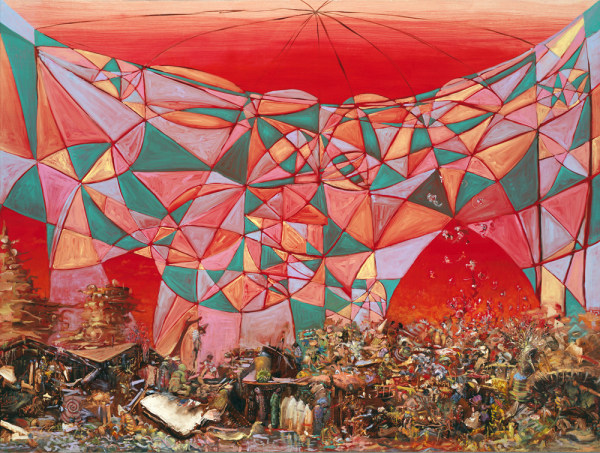
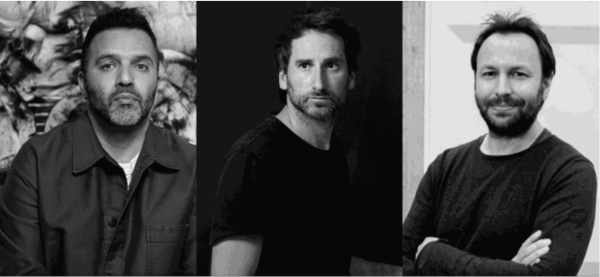
From the earliest uses of lapis lazuli in Ancient Egypt, through the Renaissance when the semi-precious stone was used to create ultramarine, a colour so venerated it was reserved to represent the Virgin and denote her heavenly robes, to Picasso's Blue Period and Yves Klein's patented IKB, blue has occupied a special place in visual culture.
Registration details released on Wednesday 24 February, 12pm GMT
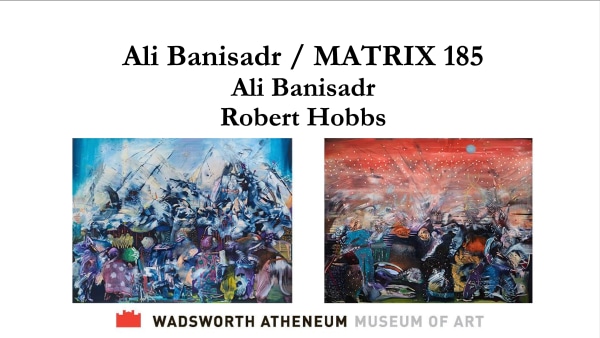
Ali Banisadr composes abstract dreamscapes that describe his impressions of the trauma of the war and conflict he experienced as a child in his native Tehran. The artist considers his MATRIX installation, as well as his relationship to art history and sound in discussion with distinguished critic and professor emeritus of art history Robert Hobbs.
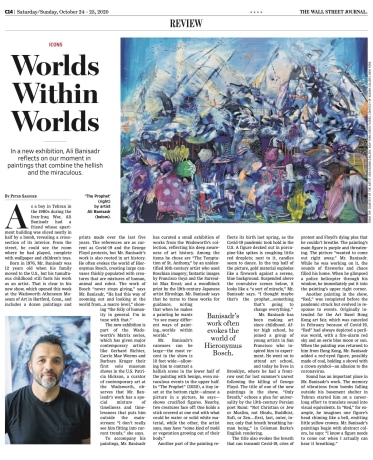
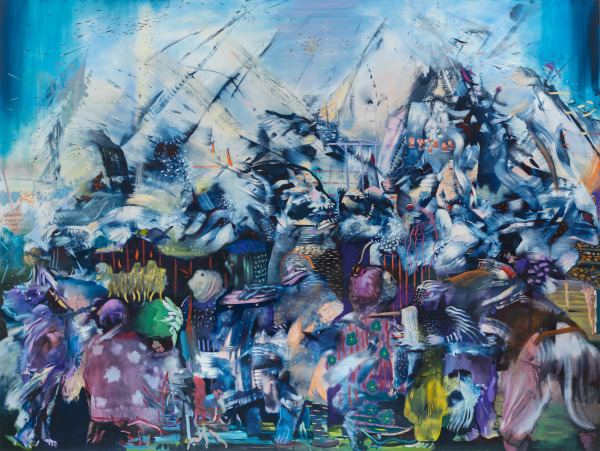
Occupying the “between space” of fantasies and dreams, Ali Banisadr’s lively paintings explore intangible worlds balancing figuration and abstraction, order and disorder, energy and entropy. The artist’s process is rooted in synesthesia—an internal response to sound that takes visual form as energy and rhythm in his painterly compositions. This creative approach began in Iran when he was a boy, in response to Iraqi bombings. Fleeing to Turkey, then California, and now living in New York, Banisadr’s life experiences have fueled his interest in different cultures, art history, and the current events that inform his art. Hallucinogenic or monochromatic color palettes heighten the drama of veiled masses in motion or commotion as if on a stage. He differentiates individual figures by pattern and style, variously applying paint with brushes, rags, and sticks. Like an all-seeing eye, Banisadr observes and considers societies past, present, and future and acts as a social critic on the human condition.
Known for his wide-ranging sources of inspiration, Banisadr asked to curate a small selection of Wadsworth collection works that illuminate his artistic interests. Within the MATRIX gallery, Banisadr has assembled prints, drawings, paintings, and a construction dating from the 16th to the 20th century from a variety of cultures. These include a panel painting after Hieronymus Bosch, Caprichos prints by Francisco Goya, woodblock landscape prints by Utagawa Hiroshige, and an assemblage by Joseph Cornell. Whether abstract or representational, Banisadr finds a kinship in their subject matter: strangely vivid worlds often animated with disturbing creatures.
Taking a broader view of the collection, Banisadr has also created a video collage of works on view throughout the museum that inspire him. Interested in showing his artist’s eye, the collage presents specific details in works of art where his focus is drawn. Banisadr’s video collage will be accessible both in the gallery and remotely on the Wadsworth’s social media channels and on thewadsworth.org.
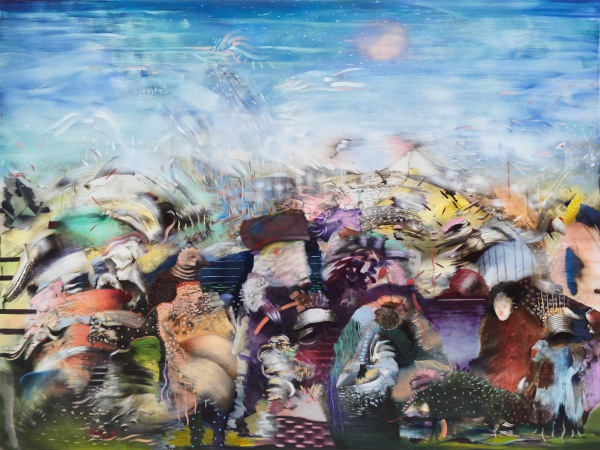
The Benaki Museum is hosting Ali Banisadr’s first solo exhibition in Greece entitled Ultramarinus – Beyond the Sea, at the Spyridon & Eurydice Costopoulos Gallery, Museum of Greek Culture, curated by Polina Kosmadaki, Curator of Modern and Contemporary Art and Head of the Benaki Museum Paintings, Drawings and Prints Department.
The exhibition title refers to Ultramarine, the blue colour pigment used as early as the Middle Ages, which was originally extracted from the gemstone lapis lazuli and is believed to encapsulate all shades of water and skies. Artists such as Kandinsky associated Ultramarine with the awakening of the transcendental element. Moreover, in Eastern philosophy, this colour is linked to the sixth chakra (or “third eye”), the awakening of “elevated consciousness”.
The religious, cultural and supernatural connotations of such a unique colour are crucial to Banisadr’s expressive works, in which interrelations with ancestral forms of painting are consolidated. In this exhibition, the dialogue between key works of the artist’s oeuvre and Islamic and Chinese ceramics of the Benaki Museum collections serves as a foothold for projecting the past onto the present. The free associations of forms, sources and various narratives are driven by this powerful colour which dominates Banisadr’s ardent landscapes. In particular, a section of the exhibition features works in blue and white, which act as a kind of essay on the symbolism and “magical” properties of the colour blue.
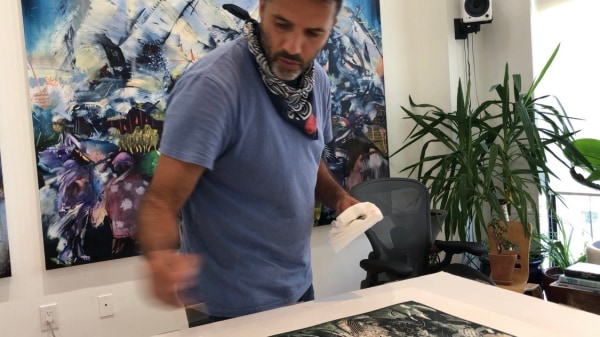
Paintings and works on paper by Ali Banisadr, who was born in Tehran in 1976, are characterised by dreamlike, hallucinatory and often seemingly chaotic landscapes. Inspired by childhood memories, imaginary scenes, the history of painting and sound, these themes underscore his paintings which have been the subject of numerous solo and group international exhibitions and which are housed in some of the world's most important museum collections.
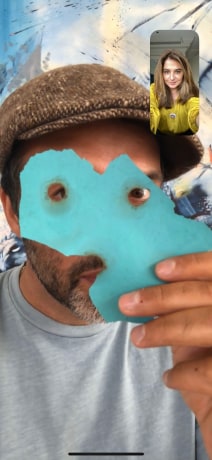
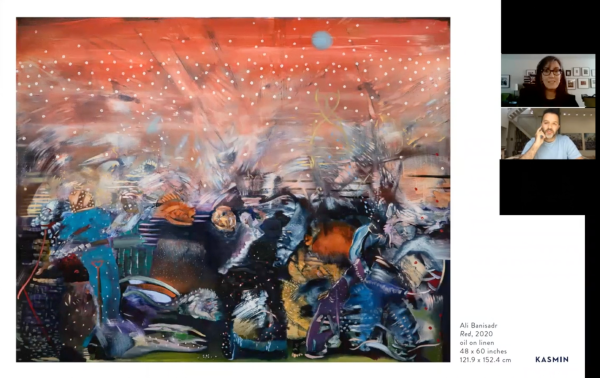
ALI BANISADR AND PATRICIA HICKSON, THE EMILY HALL TREMAINE CURATOR OF CONTEMPORARY ART AT THE WADSWORTH ATHENEUM MUSEUM OF ART, DISCUSS HIS NEW PAINTING 'RED', ALONGSIDE SELECT WORKS BY MAX ERNST, AND BANISADR’S UPCOMING MATRIX EXHIBITION THIS FALL.
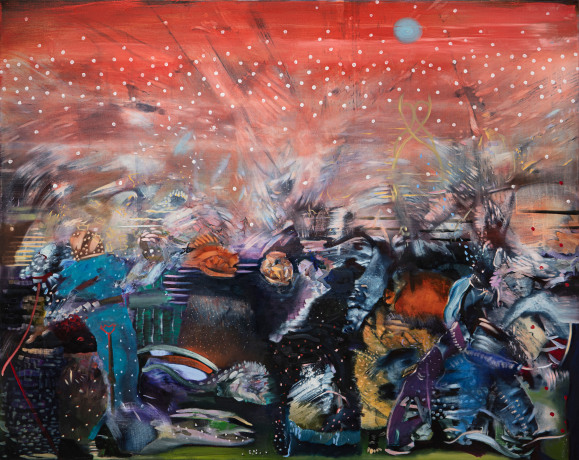
Ali Banisadr’s latest painting, Red, embodies the existential force of the natural world and the artistic urge to reconcile chaos through the act of creation. Banisadr began the large-scale painting in late 2019 before stepping away from the work in January 2020. Despite its appearance of completion, Banisadr “had a sense that I needed to do more to it.” After the global pandemic struck and countries across the world went into lockdown, he says, “the work made sense to me in a new way.” Banisadr then revisited the painting with renewed dedication, finishing at the end of March 2020.
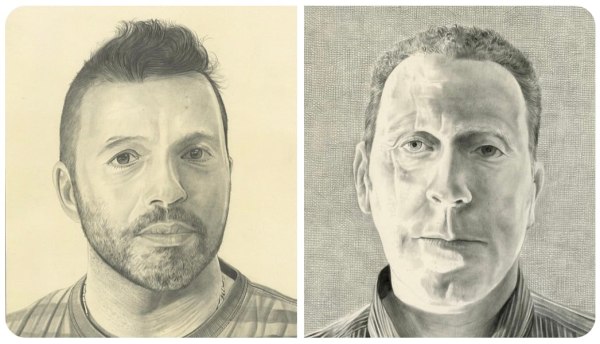
Video of live conversation with special guest Ali Banisadr and host David Anfam to discuss creative life in the context of our new social reality. This gathering will conclude with a poetry reading by a member of our staff.
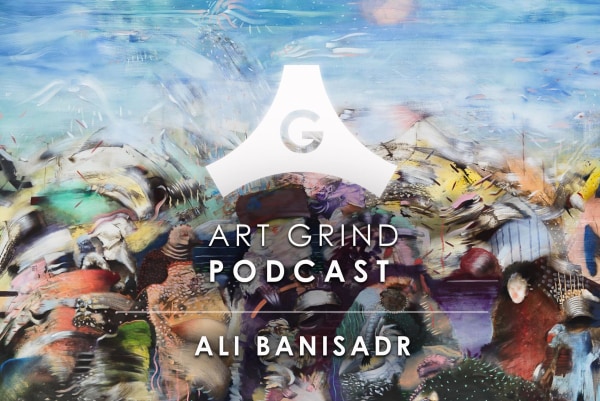
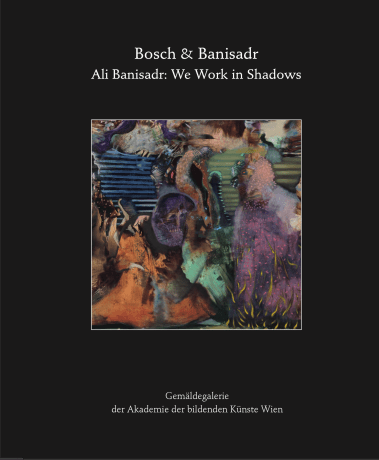
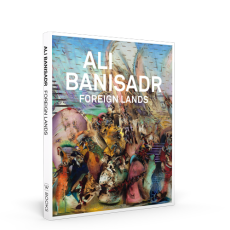
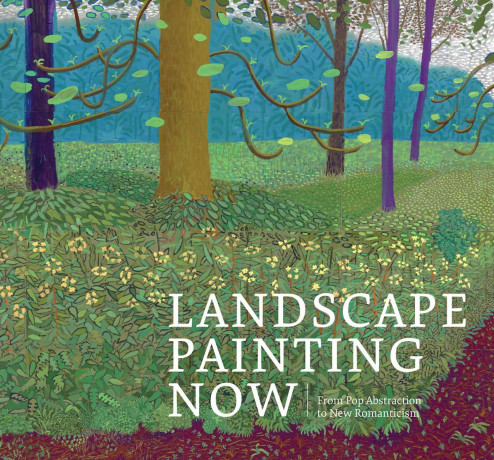
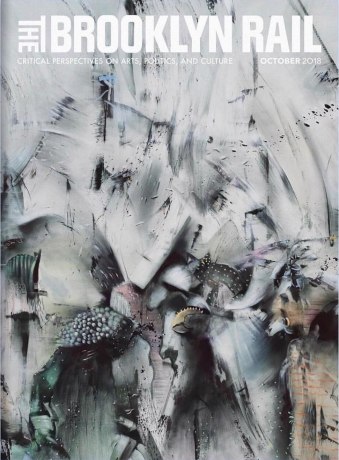
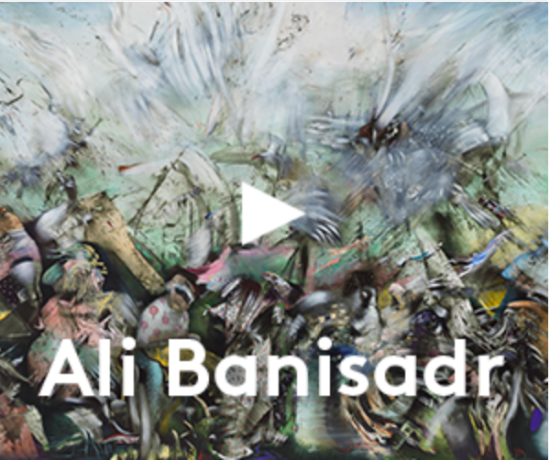
With his first German solo show at Blain|Southern Berlin open until 17 November, the New York-based artist discusses using drawings to make sense of his intense childhood in Iran and sound being a guiding force
